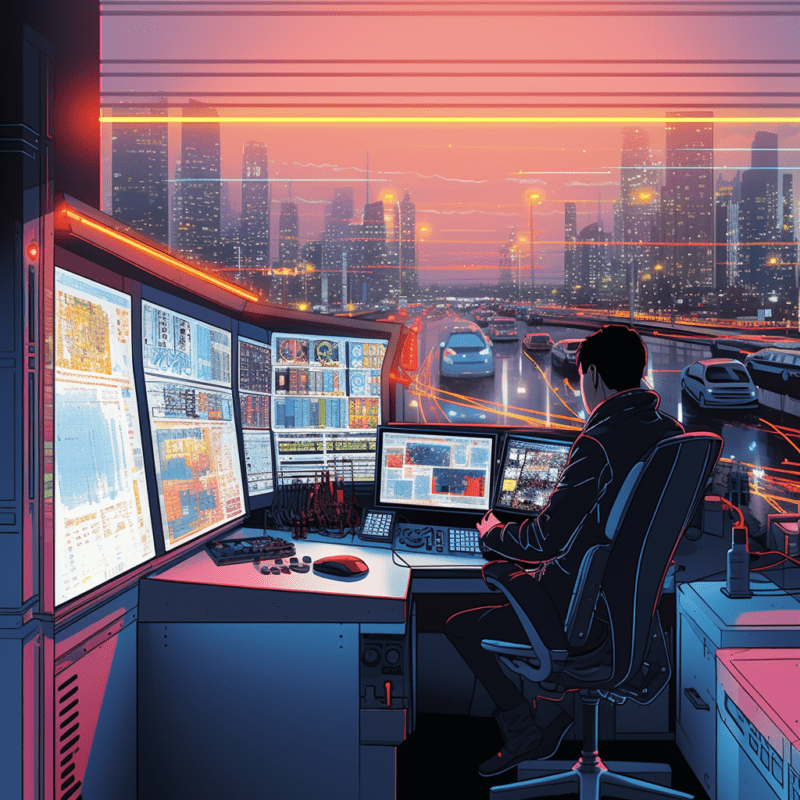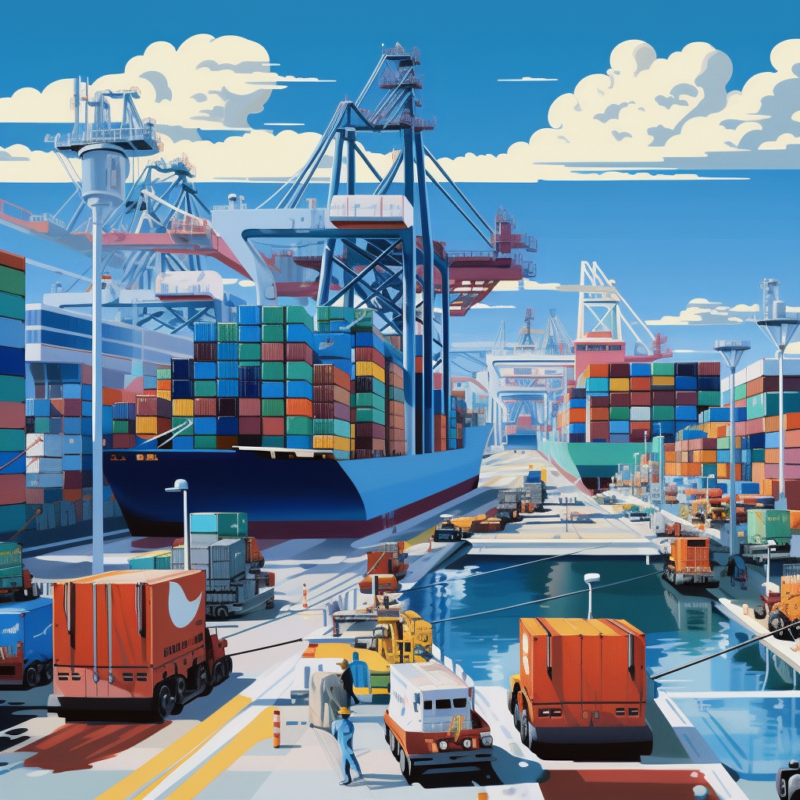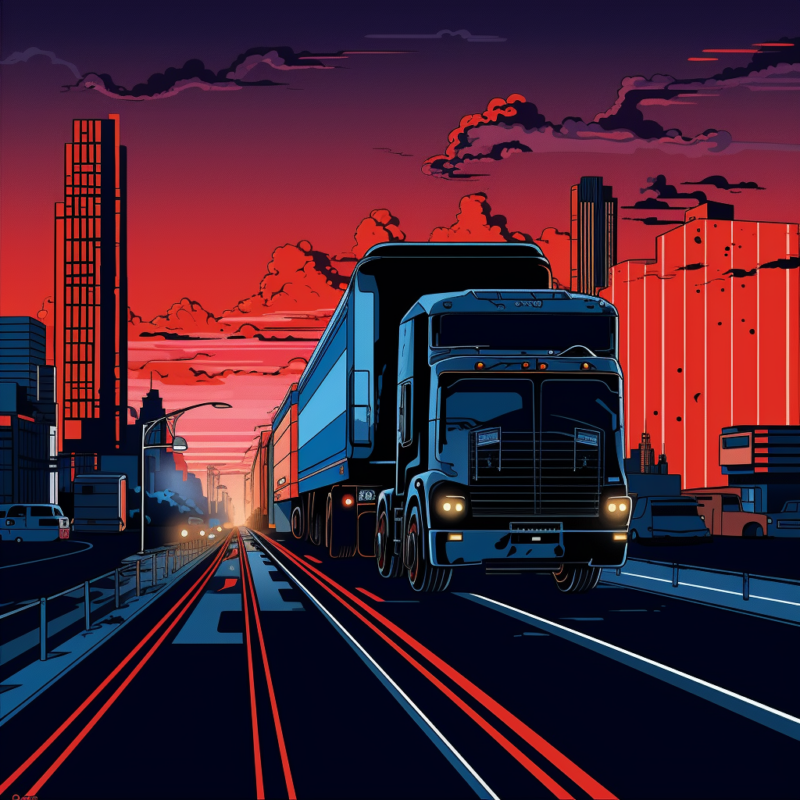In the fast-evolving world of logistics and transportation, the use of advanced technologies like Artificial Intelligence (AI) and Robotic Process Automation (RPA) is no longer a futuristic concept, but an operational necessity. As businesses continually seek ways to enhance efficiency, reduce costs, and improve service delivery, AI and RPA are emerging as essential tools in revolutionizing truck dispatch operations.

As a pioneer in the trucking dispatch industry, Ninja Dispatch is firmly at the helm of this technology-driven movement. We recognize the immense potential of AI and RPA in not only streamlining dispatch processes but also in reshaping the broader logistics landscape. Embracing innovation, we are currently in the process of leveraging UI Path, a leading RPA platform, to automate complex, repetitive tasks, thereby allowing our human dispatchers to focus on more strategic and customer-centric activities.
This article delves deeper into the role and benefits of AI and RPA in truck dispatch operations, and sheds light on Ninja Dispatch’s ongoing efforts to drive operational excellence through these technologies. Welcome to the future of truck dispatching!
Unraveling the Intricacies of Conventional Truck Dispatching
Truck dispatching, in its traditional sense, is often more complex than it appears. A dispatcher plays a critical role in coordinating logistics, managing transportation, and ensuring the timely and efficient delivery of goods. But as simple as it sounds, this process is far from straightforward and involves grappling with a number of challenges.
Firstly, finding, hiring, and training competent dispatchers can be a costly and time-consuming process. It requires significant time investment to onboard new hires, coach them about the industry specifics, and train them to leverage dispatch software efficiently. However, despite this rigorous training, the potential for human error remains, simply due to the intricate nature of the job.
Secondly, dispatchers work in a high-stress environment, managing multiple tasks simultaneously, and making quick decisions that can have substantial operational implications. The emotional stress and physical exhaustion resulting from this constant pressure often lead to oversights and mistakes. Moreover, these factors, combined with the traditional 9-5 working hours, can severely limit a dispatcher’s productivity and effectiveness, leading to operational inefficiencies.
Thirdly, maintaining 24/7 operations with a limited workforce and conventional working schedules is a challenge in itself. Overnight shifts and working on weekends can lead to employee burnout and high turnover rates, escalating the issues of recruitment and training, and creating a vicious cycle of inefficiency.

Lastly, in the traditional dispatch model, manual data entry and repeated information verification are commonplace. These repetitive, monotonous tasks not only consume valuable time but also increase the likelihood of errors, leading to further inefficiencies and potential customer dissatisfaction.
Clearly, the traditional model of truck dispatching has its share of shortcomings. But, what if there were a way to streamline these complexities, minimize human error, and ramp up efficiency? Enter the world of AI and RPA – the tech-savvy solutions revolutionizing the truck dispatch landscape.
AI and RPA: Revolutionizing the Logistics Landscape
Artificial Intelligence (AI) and Robotic Process Automation (RPA) are two technological advancements creating ripples in various industries, with logistics being no exception. To truly appreciate their transformative potential, we need to delve into their specifics.
AI, in the context of logistics, is a combination of machine learning models (MLMs) and sophisticated algorithms that can learn, predict, and adapt to the dynamic nature of logistics management. This AI capability can essentially create a new type of dispatcher who doesn’t just react to situations but proactively predicts and optimizes workflows.
UI Path, a leading RPA provider, originates from Bucharest, Romania, the same city where Ninja Dispatch has significant operations. They have been instrumental in bringing RPA to the mainstream and are continually innovating to enhance its applications. RPA, by design, can automate mundane, repetitive tasks, minimizing the risk of human error and significantly improving operational efficiency. This is achieved by programming software ‘bots’ to mimic human actions within digital systems. RPA essentially creates a virtual workforce that can tirelessly work round-the-clock, efficiently managing tasks that are otherwise laborious for humans.

What makes RPA truly exciting, especially for businesses like Ninja Dispatch, is its ability to couple with AI technologies. This combination of AI’s intelligent decision-making capabilities and RPA’s efficient process automation presents a promising solution to overcome the challenges of traditional truck dispatching. It’s a step towards creating an AI-enhanced RPA or, as we like to call it, a ‘super dispatcher’, capable of high efficiency, precise decision-making, and proactive problem-solving.
In essence, the evolution of AI and RPA heralds a new era in logistics management, one where technology empowers human dispatchers, enhancing their abilities and revolutionizing the way logistics is managed. This is the exciting, tech-savvy future Ninja Dispatch is pioneering in truck dispatch operations.
Artificial Intelligence (AI): Ushering in a New Era of Truck Dispatching
Artificial Intelligence (AI) is more than a buzzword in today’s tech-savvy world. It’s an influential force disrupting traditional business models and pushing the boundaries of what’s possible, particularly in industries such as logistics and truck dispatching.
In essence, AI incorporates advanced algorithms and machine learning models that can analyze vast amounts of data, learn from patterns, predict outcomes, and make informed decisions. In the context of truck dispatching, AI’s potential is enormous.

Imagine having an intelligent system that can monitor hundreds of trucks simultaneously, assess road and weather conditions, consider driver schedules, and predict logistical challenges. All these while considering variables like traffic, route efficiency, and load management. This isn’t a glimpse into some distant future; it’s what AI brings to truck dispatching today.
The real beauty of AI in this setting is its ability to become a ‘dispatcher for the dispatcher’. An AI-enabled system can monitor operations on a macro level, analyzing patterns and identifying potential challenges. It allows dispatchers to understand the broader picture, highlighting issues before they become disruptive and suggesting optimized solutions.
In simpler terms, AI empowers dispatchers with the information they need when they need it. It provides insights that human dispatchers might miss due to sheer volume or complexity, giving them the tools to make the best possible decisions. This, in turn, leads to improved operational efficiency, cost savings, and, ultimately, better service for the end customers.
Ninja Dispatch is embracing AI technology, harnessing its capabilities to transform the dispatching process, and creating a future where technology and human expertise work together in seamless harmony.
Robotic Process Automation (RPA): Elevating Efficiency in Truck Dispatch Operations
In a world that continually demands more speed, efficiency, and precision, Robotic Process Automation (RPA) steps up as an undeniable asset. Originating from the vibrant tech scene of Bucharest, Romania – a locale shared with Ninja Dispatch’s European offices – RPA is revolutionizing how businesses operate, particularly in the realm of logistics and truck dispatch.
RPA, as its name suggests, uses software robots or ‘bots’ to automate routine, repetitive tasks. These are tasks that, while necessary, often consume significant amounts of time and are prone to human error. By automating these tasks, RPA allows human staff to focus on more critical, strategic tasks, thereby enhancing overall productivity.
Now, envision applying this transformative technology to truck dispatching. Automating processes like data entry, order processing, and schedule management significantly streamline operations. It reduces the scope for errors and ensures a higher degree of accuracy, improving the efficiency and reliability of dispatch services.
A sector that greatly benefits from RPA is night dispatch and after-hours operations, where Ninja Dispatch is a leading player. In these challenging time windows, RPA can handle many tasks without fatigue, from maintaining real-time status updates to instantaneously responding to critical incidents. It ensures that no matter the time, the quality and speed of dispatch operations remain consistent.
Moreover, RPA in dispatching can also provide real-time updates and tracking, ensure regulatory compliance, and optimize routes based on variables like traffic and weather conditions. All this information, when passed onto dispatchers, equips them with the necessary data to manage fleets more effectively.
In short, RPA is not just about automating tasks. It’s about fostering a symbiotic relationship between humans and technology to enhance efficiency, ensure accuracy, and redefine what’s possible in truck dispatching. Ninja Dispatch recognizes the potential of RPA and is actively integrating this powerful tool into its operations, proving yet again its commitment to innovation and exceptional service.
Real-World Examples of AI and RPA in Truck Dispatching
Admittedly, the realm of AI and RPA in truck dispatching is still an emerging field, and thus, large-scale implementations are not as commonplace as in other sectors. However, several pioneering companies are experimenting with these technologies, yielding promising results that point to a transformative future. Here are a couple of such instances:
UIPath and Posten Norge

Posten Norge, the Norwegian postal service, partnered with UIPath, the Bucharest-based RPA leader, to enhance their logistics and delivery operations. By using RPA, they were able to automate repetitive tasks, such as sorting packages, tracking shipments, and customer communication. The result was improved efficiency, increased customer satisfaction, and significant cost savings. This shows how automation technologies like RPA can be applied to logistics operations, including truck dispatching, with great effect.
AI-based Predictive Analytics for Fleet Management
A leading global logistics company adopted AI-based predictive analytics to enhance its fleet management operations. The AI system collects and processes vast amounts of data, including vehicle health, driver behavior, weather conditions, and route information. It uses this data to predict potential issues, such as vehicle breakdowns or delivery delays, allowing dispatchers to take preemptive measures and avoid disruptions. This is a shining example of how AI can provide invaluable assistance to dispatchers, turning them into proactive problem-solvers.
Uber Freight
Uber Freight, a branch of the popular ride-hailing service, applies AI and machine learning to the logistics industry. By leveraging the power of AI, Uber Freight matches carriers with shippers based on various factors like location, equipment type, and schedule. The technology also optimizes routes and provides real-time tracking and status updates. These examples indicate how AI can streamline dispatch operations and improve efficiency.
While these are not directly related to truck dispatching, they do showcase the potential of AI and RPA in the logistics sector. Companies like Ninja Dispatch are poised to drive this technological revolution within the truck dispatching sphere, creating a future where dispatch operations are more efficient, accurate, and responsive than ever before.
The Future of Truck Dispatching with AI and RPA
As we navigate through the digital age, it’s clear that the next frontier for truck dispatching lies at the intersection of AI and RPA. These technologies are set to redefine the way logistics and transportation businesses operate, adding a new level of efficiency, accuracy, and intelligence to dispatch operations.
With AI, the possibility of having an intelligent assistant that can predict, analyze, and make informed decisions becomes a reality. This assistant won’t merely execute orders but will comprehend the entire trucking operation ecosystem and contribute to optimizing it. AI-powered systems can proactively identify potential issues, predict delays, suggest optimal routes, and even manage communication with drivers, thus minimizing human errors and enhancing operational efficiency.

RPA, on the other hand, is geared towards automating repetitive, rule-based tasks that often take up a significant portion of a dispatcher’s time. These include data entry, record maintenance, tracking, reporting, and much more. By automating these tasks, RPA frees up dispatchers to focus on more strategic aspects of their job, such as dealing with exceptional cases, decision-making, and improving customer service. Moreover, RPA is especially potent when it comes to after-hours and night dispatch, where human error can be more pronounced due to fatigue or reduced concentration.
At the forefront of this technological revolution is Ninja Dispatch. Leveraging years of experience in the industry, we understand the challenges that traditional dispatching poses and are committed to tackling them head-on with cutting-edge technology. Our team is currently developing an AI software designed to assist trucking companies in managing their dispatch operations more efficiently.
This software isn’t just a tool; it’s a game-changing ally that works round the clock, optimizes operations, and creates a seamless connection between dispatchers, drivers, and the end customer. With its ability to adapt to different situations, anticipate problems, and offer effective solutions, this AI assistant will become an invaluable part of any trucking operation.
Indeed, the paradigm shift towards AI and RPA in truck dispatching is not merely a concept for the distant future – it’s a transformation already unfolding. With Ninja Dispatch at the helm of this revolution, logistics and transportation companies can anticipate a promising era where dispatching extends beyond mere coordination of trucks. Our services integrate intelligence, automation, and top-tier efficiency, effectively fueling business progression and enhancing customer satisfaction.
Embrace the Future with Ninja Dispatch
In conclusion, the dawn of AI and RPA in truck dispatching is here, and it’s reshaping the landscape of logistics operations, offering unparalleled levels of efficiency, accuracy, and intelligent decision-making. These technologies are more than just innovations; they represent a paradigm shift in how we handle dispatch operations, particularly in challenging scenarios such as after-hours and nighttime dispatch.

However, the path to successfully integrating AI and RPA into your trucking operations can seem complex and daunting. That’s where Ninja Dispatch comes in. With our deep industry knowledge and commitment to innovation, we’re helping businesses navigate this transition, turning challenges into opportunities for growth and success.
Our services, particularly in the realm of night dispatch and night tow dispatch, leverage the benefits of these technologies to ensure seamless, round-the-clock operations. Our mission is to help your business stay ahead of the curve, delivering exceptional service, anytime and every time.
If you’re interested in exploring the future of truck dispatching and seeing how AI and RPA can revolutionize your operations, we invite you to reach out to Ninja Dispatch. Let’s usher in a new era of truck dispatching together. The future is just a call away.
